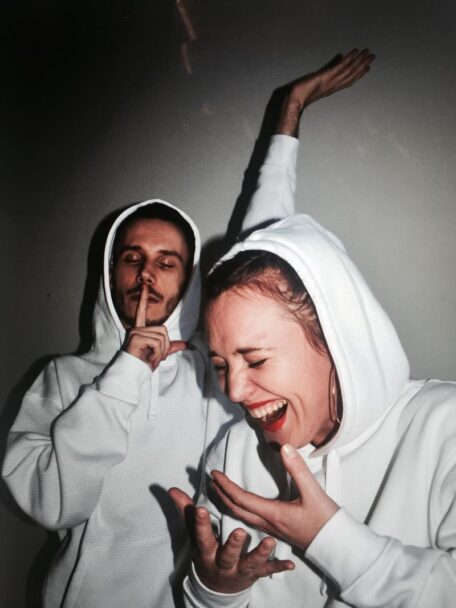
Photo: Katarzyna Szugajew
On 7-8th of January 2017 at 7 p.m. as part of the Dance Activism. Spaces of Choreography cycle, Warsaw?s Nowy Theatre (ul. Madalińskiego 10/16) is pleased to invite everyone to the presentation of So Emotional choreographed by Przemek Kamiński and Marta Ziółek, dramaturged by Mateusz Szymanówka. The piece inspects the capacity of the body for action and defiance, its individual and collective transformations, while also applying choreographic tools to probe theatre. The artists populate landscapes of ecstasy and despair, rage and fear, using the emancipating potential of movement to dissect them. The emotionally overloaded forms circulate in the network and outside of its confines, sculpting bodies and identities. Theatre is an ?emotional machine?, producing and propelling affects, emotions, and moods. If the body is a battleground, and its affects and emotions are a new front of political struggle, then how can one prepare for it?
concept: Przemek Kamiński, Mateusz Szymanówka, Marta Ziółek
choreography and performance: Przemek Kamiński, Marta Ziółek
dramaturgy: Mateusz Szymanówka
music: Lubomir Grzelak
lighting design: Aleksandr Prowaliński
video: Katarzyna Borelowska
photography: Katarzyna Szugajew
produced by: Nowy Theatre
The performance is supported by the Visegrad Artist Residency Programme ? Performing Arts, art quarter budapest, and the Adam Mickiewicz Institute.
Przemek Kamiński is a performer and choreographer. He graduated in Dance, Context and Choreography from the HZT Inter-University Centre for Dance Berlin. His scope of work includes performing and visual arts. He is interested in choreography as an extensive practice spanning a variety of formats and media. As a dancer, he regularly co-operates with the Berlin-based choreographer Isabelle Schad.
Mateusz Szymanówka is a dramaturgue and curator. He deals with contemporary performance, dance and choreography. He studied cultural studies, theatrology and dance studies in Warsaw and Berlin. As a curator, he implemented a number of projects and programmes for the Studio Theatre in Warsaw (Dance Studio Stage, 2016), Jan Tarasin Gallery in Kalisz (Back to the future, 2016), Muzeum Sztuki in Łódź (Systems of reference. Choreography at the Museum exhibition, together with Katarzyna Słoboda, 2016).
Marta Ziółek is a choreographer and performer. Before she began her study of choreography at the School for New Dance Development (SNDO) in Amsterdam, she was a student of an inter-faculty humanities programme at the University of Warsaw. She received the prestigious danceWEB scholarship at ImpulsTanz Festival in Vienna and a scholarship from the Amsterdam Fund for the Arts. Her piece Zrób siebie (Make Yourself) was awared the Young Interpretations at the INTERPRETATIONS Festival in Katowice. She is also the co-author (together with Alex Baczyński-Jenkins) of the Kem space in Warsaw.
Tickets (normal/discount/entrance card): PLN 35/25/20.
***
Dance Activism
When we talk about choreography, in the context of invited performances, we are referring to the concept of activism ? an approach favouring activity and change over stability and permanence. Activism is not understood here as social or political engagement linked with focusing on certain themes. What we have in mind is an attitude that concentrates on provoking motion and setting in motion. The choreography we want to present takes changeability and instability as a prerequisite. It does not follow a single theatre convention, but it seeks and offers ways of embodiment that follow the logics of consistent search. It strives to expand the limits of forms that create meanings. It provokes and activates different ways of perceiving and experiencing movement, and, consequently, the body, space, time, the object and their relationships. We propose to shift attention from what movement in dance may represent, may mean, to how it achieves that ? how it is formed and manifested, how it changes and is subject to change. We are wondering in what fields choreography can function in current times.
Spaces of Choreography
The goal of this series is not to (re)formulate the definition of dance, but to ask the question what dance may be and what it may do, what performative force it manifests. We also want to put in circulation and develop the concept of choreography in a more conscious way.
Choreography, which literally means writing down the dance, is presently being appropriated by different fields, from social sciences to exact and natural sciences. In biological sciences, there is talk about, for example, molecular and cellular choreography; in physics ? about n-body choreography; in programming, there is the Web Service Choreography Interface ? a specification that describes the dynamics of interaction between Internet services. In his book Social Choreography: Ideology as Performance in Dance and Everyday Movement, Andrew Hewitt writes about choreography as a method of practicing ideology; and the Institute of Social Choreography in Frankfurt am Main explores the ways choreography may contribute to the development of non-standard social practices and systems.
In its relationship with dance, choreography often remains in the background. For example, until recently there were no choreography schools that admit candidates without educational background in dance. For us, it is interesting to shift the attention from dance to choreographic processes and practices. We see choreography as a technology of action, composing the directions / manifestations of movement in specific conditions ? navigating the processes, forming actions, providing the framework for events, organising the movement of elements that make up the situation created.
The series we offer sets the concept of choreography in the centre of attention.
Dance activism is a space for choreography.
Media patrons: taniecPOLSKA.pl, Dwutygodnik.com